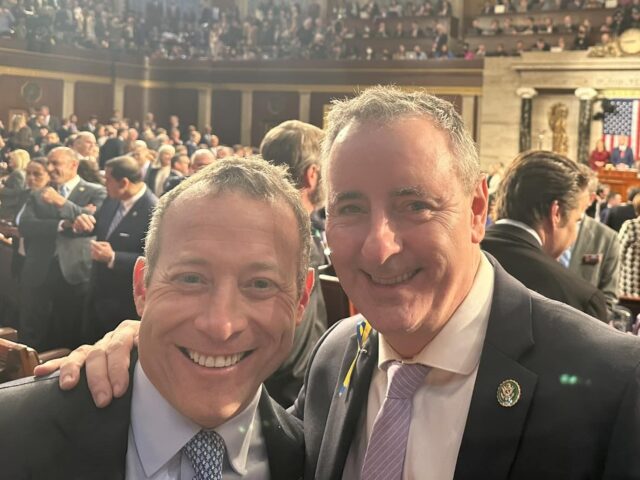A coalition of moderate Republicans and Democrats is quietly working on a government funding deal to avert or minimize a shutdown and leave House conservatives seeking spending cuts and enhanced border security out to dry once again.
The House Problem Solvers Caucus, a centrist group split evenly between Democrats and Republicans, is working on a deal to extend current government funding levels for 30 days that includes a White House-requested $40 billion add-on primarily to aid Ukraine’s war effort. The moderates’ efforts emerged after a dozen or so conservatives balked at a deal negotiated over the weekend between conservatives in the House Freedom Caucus and the moderate Republican Main Street Caucus on a 30-day stopgap funding bill to give Congress breathing room to find a longer-term deal. In addition to spending cuts, that compromise includes most of the provisions in H.R. 2, border security legislation passed by the House and widely supported by the GOP’s border hawks. Republican opposition to the weekend deal primarily stems from concerns it does not go far enough to cut spending.
Yet with their colleagues within the House Republican Conference now openly working with Democrats and the deadline to act approaching, proponents of the Freedom Caucus and Main Street Caucus deal may have a powerful new argument that the choice may be between the weekend deal including significant conservative wins or the centrist deal largely perpetuating the status quo and leaving conservatives empty-handed again.
“Getting rolled by the uniparty is the worst-case scenario here,” a senior GOP aide told Breitbart News. “The establishment on both sides would get to throw up their hands without a real fight and go back to fundraising off the stuff they won’t change.”
Speaker Kevin McCarthy (R-CA) is unlikely to endanger his speakership by bringing a Problem Solvers deal, or any other deal requiring Democrat support, up for a vote. However, architects of that bipartisan scheme could use a parliamentary tool called a discharge petition to force a vote on their bill. Before a bill can be forced to the floor, this tactic requires 218 representatives to sign the discharge petition as well as 30 days after the legislative text is introduced, which could not occur before the current September 30 funding deadline. However, in the event of a shutdown, this strategy’s proponents see their deal as a sort of shutdown-ending salvation. If successful, the bulk of those 218 signatures are likely to be from the hands of Democrats.
With the fiscal year ending September 30, any side wanting its framework to be the House baseline in negotiations with the Senate has little time to waste. To head off momentum for a Problem Solvers deal, proponents of the Freedom Caucus and Main Street Caucus deal are trying to pick off some of their colleagues who came out early in opposition, and the argument that their deal might be the best conservatives can hope for might, at least, cause some to reconsider.
“The swamp would preserve the status quo,” the GOP aide said of the Problem Solvers deal, “and conservatives would get nothing: do not pass go, do not collect $200.”

COMMENTS
Please let us know if you're having issues with commenting.